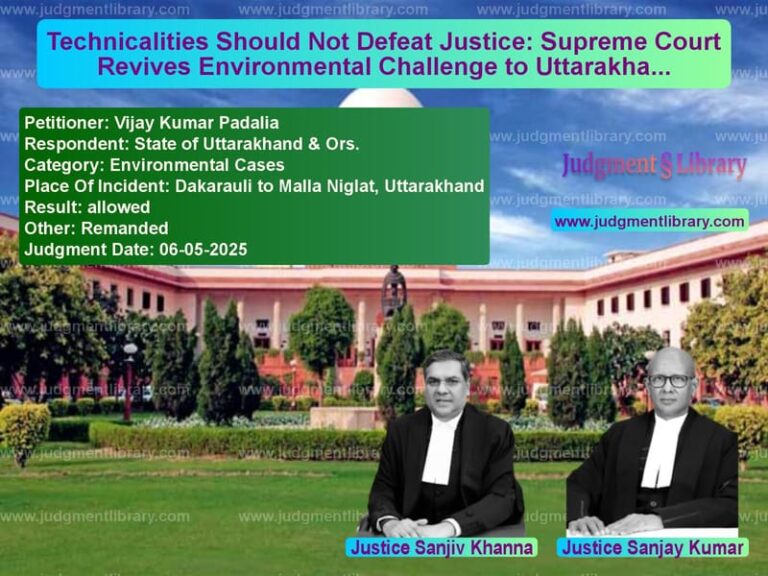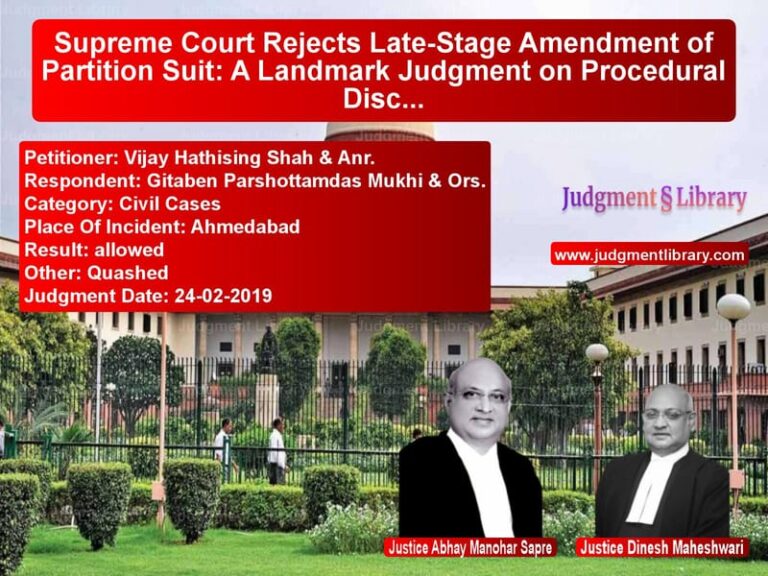Supreme Court Clarifies Jurisdiction of Debt Recovery Tribunal in Financial Disputes
The case of Standard Chartered Bank vs. MSTC Limited presented a pivotal issue regarding the jurisdiction of the Debt Recovery Tribunal (DRT) under the Recovery of Debts and Bankruptcy Act, 1993 (RDB Act). The Supreme Court was required to determine whether financial transactions arising from commercial agreements could be adjudicated under the DRT framework and whether the High Court had erred in extending the limitation period for review petitions beyond the prescribed 30 days.
Background of the Case
Standard Chartered Bank and MSTC Limited entered into a Receivables Purchase Agreement on August 29, 2008, under which the bank purchased receivables from MSTC related to invoices raised on foreign buyers. This agreement included:
- Payment of 95% of the invoice value by the bank upfront.
- Coverage through an Export Insurance Policy issued by ICICI Lombard General Insurance Company.
- Rejection of the bank’s insurance claim by ICICI Lombard on March 3, 2011.
Following the insurance claim rejection, Standard Chartered Bank sought recovery of Rs. 191.03 crore from MSTC and approached the DRT Mumbai under Section 19 of the RDB Act.
Key Legal Issues
The Supreme Court considered two main legal questions:
- Whether the DRT had jurisdiction over disputes arising from financial agreements such as the Receivables Purchase Agreement.
- Whether MSTC’s review petition, filed beyond the 30-day limitation period, could be entertained under Rule 5A of the DRT (Procedure) Rules, 1993.
Arguments by the Petitioner (Standard Chartered Bank)
The bank contended that:
- The Receivables Purchase Agreement created an enforceable financial obligation, which qualifies as a ‘debt’ under the RDB Act.
- MSTC’s financial statements acknowledged an outstanding liability of Rs. 222.51 crore, substantiating the bank’s recovery claim.
- The review application filed by MSTC beyond the 30-day limitation period was not maintainable under Rule 5A of the DRT Rules.
- The High Court exceeded its jurisdiction by extending the limitation period, as Section 5 of the Limitation Act does not apply to review petitions before the DRT.
Arguments by the Respondent (MSTC Limited)
MSTC Limited countered that:
- The Receivables Purchase Agreement was a commercial contract and not a ‘debt’ under the RDB Act, thereby excluding it from DRT jurisdiction.
- The High Court correctly allowed the review petition by interpreting Section 19 of the RDB Act to include review proceedings.
- The procedural rules governing the DRT should be interpreted in a manner that allows flexibility and prevents injustice.
Supreme Court Observations
The Supreme Court made the following key observations:
- The Receivables Purchase Agreement, by its nature, created a financial liability enforceable under the RDB Act.
- The admissions in MSTC’s balance sheet constituted acknowledgment of debt, making it a recoverable claim under the DRT framework.
- Review petitions under Rule 5A of the DRT Rules must be filed within 30 days, and Section 5 of the Limitation Act does not apply to these proceedings.
- The High Court’s ruling condoning the delay in filing the review petition was erroneous and beyond the scope of its authority.
Key Legal Precedents Considered
The Supreme Court referred to several past rulings to reinforce its findings, including:
- ICICI Bank vs. Official Liquidator – Recognizing financial agreements as recoverable debts under the RDB Act.
- Union Bank of India vs. Seppo Rally – Holding that admissions of liability in financial statements are valid grounds for debt recovery claims.
- Mardia Chemicals vs. Union of India – Establishing that financial disputes involving contractual obligations fall within the DRT’s jurisdiction.
Final Judgment
Based on the legal analysis, the Supreme Court ruled:
- The DRT had jurisdiction to entertain the bank’s recovery application.
- MSTC’s review petition was time-barred and should not have been considered.
- The High Court’s ruling was set aside as it exceeded its authority in extending the limitation period.
- The case was remanded to the DRT for further proceedings regarding Standard Chartered Bank’s recovery claim.
Conclusion
This landmark judgment reinforced the principle that financial transactions involving legally enforceable obligations fall within the purview of the DRT. Additionally, it emphasized that statutory limitation periods must be strictly adhered to, ensuring procedural consistency in debt recovery cases.
Petitioner Name: Standard Chartered Bank.Respondent Name: MSTC Limited.Judgment By: Justice R.F. Nariman.Place Of Incident: Mumbai.Judgment Date: 21-01-2020.
Don’t miss out on the full details! Download the complete judgment in PDF format below and gain valuable insights instantly!
Download Judgment: Standard Chartered B vs MSTC Limited Supreme Court of India Judgment Dated 21-01-2020.pdf
Direct Downlaod Judgment: Direct downlaod this Judgment
See all petitions in Bankruptcy and Insolvency
See all petitions in Corporate Compliance
See all petitions in unfair trade practices
See all petitions in Judgment by Rohinton Fali Nariman
See all petitions in partially allowed
See all petitions in Modified
See all petitions in supreme court of India judgments January 2020
See all petitions in 2020 judgments
See all posts in Corporate and Commercial Cases Category
See all allowed petitions in Corporate and Commercial Cases Category
See all Dismissed petitions in Corporate and Commercial Cases Category
See all partially allowed petitions in Corporate and Commercial Cases Category







